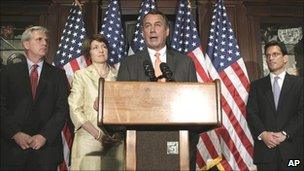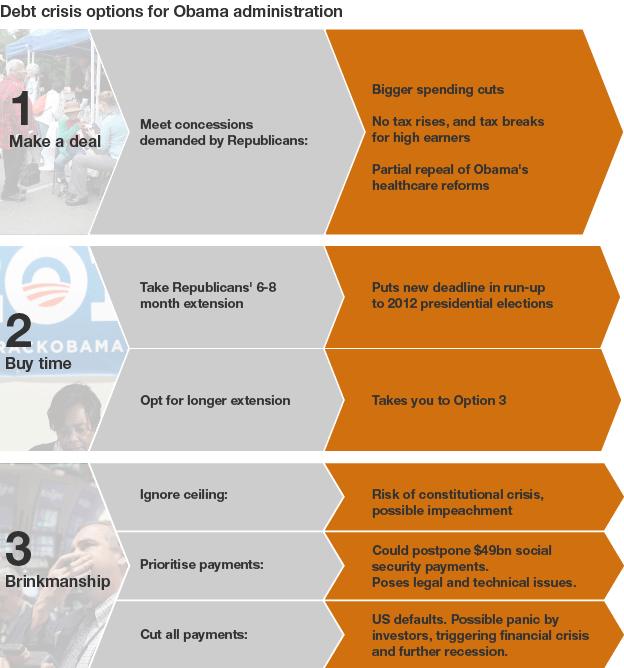Republicans attack Obama as they push their budget plan
- Published

House Speaker John Boehner (centre) said his plan would put the US fiscal house back in order
Republicans have lined up to renew their attack on US President Barack Obama over the country's looming debt default deadline.
At the Republican HQ in Washington DC, House Speaker John Boehner said his budget plan was reasonable, while Mr Obama wanted a "blank cheque".
House Majority Leader Eric Cantor said Mr Obama had no plan of his own.
White House Press Secretary Jay Carney said it was a "fallacy" to suggest the president had not made proposals.
After weeks of deadlocked budget negotiations, Washington still has no deal to raise its borrowing limit by the 2 August deadline.
The federal government runs a budget deficit that topped $1.5tn (£920bn) this year, and has amassed a national debt of $14.3tn.
'Billionaires irrelevant'
In prime-time back-to-back TV addresses on Monday evening, Mr Obama and Mr Boehner accused each other of intransigence on the debt issue.
Speaking on Tuesday alongside Eric Cantor, Mr Boehner said: "I think I made it pretty clear last night: the president's looking for a blank cheque."
Mr Boehner is advocating a two-step plan, a short-term bill to cut spending by about $1.2tn (£730bn) and extend the debt ceiling for about six months.
"It's reasonable," Mr Boehner said. "It's responsible. It can pass the House, and it can pass the Senate."
Mr Boehner called on members of both parties to consider supporting his "common sense plan... to put America's fiscal house back in order" when it arrived on the floor of the House on Wednesday.
Mr Cantor said of Mr Obama's speech on Monday night: "There was no evidence that he has a plan. He doesn't like our plan, but he has not put a plan forward yet.
"The president spent a lot of time talking about millionaires, billionaires, corporate jet owners, things that have nothing to do with the debate right now."
House Majority Whip Kevin McCarthy stepped up alongside Mr Boehner and Mr Cantor and said Mr Obama had made "a pretty political speech" the evening before.
Mr Obama condemned the Republican plan on Monday during his TV address, in part because it would require another round of debt limit talks in six months.
On Tuesday, the Office of Management and Budget said in a statement that the Obama administration "strongly opposes" the Republican plan, adding that if it is presented to Mr Obama "the president's senior advisors would recommend that he veto this bill".
Aides to Mr Boehner later noted that the statement did not commit the president to a veto.
"By signing the House bill, the president could quickly end the crisis atmosphere he's created and demonstrate he's serious about cutting spending," said Brendan Buck, a spokesman for Mr Boehner.
'Playing chicken'
In the Senate on Tuesday, Democratic Senate Majority Leader Harry Reid challenged Republicans to back his plan - a no-taxes, government-cuts proposal to trim $2.7tn over a decade.
It would protect social programmes for the poor and elderly and a public pension programme - all popular among Democrats, while not raising new tax revenue.
IMF boss Christine Lagarde: "The clock is ticking"
The 10-year plan includes $1.2tn in cuts to defence and other discretionary spending and $1tn in savings from winding down the wars in Iraq and Afghanistan.
Later on Tuesday, White House Press Secretary Jay Carney accused the Republicans of trying "to play chicken with our economy". He said Mr Reid's plan was a much better option because it "represents compromise".
"The United States hit its debt limit in May, and since May the treasury secretary... has exercised all the wiggle room available to him and that runs out on August 2," Mr Carney said.
He added: "It's whistling past the graveyard to suggest that it's some sort of game and the risks aren't enormous, because they are."
If the debt ceiling was not raised, the US Treasury could run out of money to pay all of its bills - which could lead to interest rate rises, threaten the US economy and in turn the global recovery.
